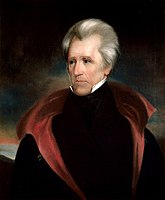1832 United States presidential election in Georgia
 | |||||||||||||||||||||||||||||
| |||||||||||||||||||||||||||||
| |||||||||||||||||||||||||||||
 County Results
| |||||||||||||||||||||||||||||
The 1832 United States presidential election in Georgia took place on November 5, 1832, as part of the 1832 United States presidential election. Voters chose 11 representatives, or electors to the Electoral College, who voted for President and Vice President.
There were two Andrew Jackson tickets in Georgia representing the two different local parties. The Troup party won with 13,881 votes, beating the Union party (formally Clark party) which got 7,367 votes. No other candidate for election was nominated by any of the factions and all received zero votes. Many sources have combined the vote when reporting the Georgia results, but this is legally incorrect.[1]
The Troup party ran Jackson with Martin Van Buren, his official running mate. The Union party ran Jackson with Barbour as veteran members of the Clark party had never forgiven Van Buren for serving as William Crawford’s campaign manager in the 1824 presidential election. Troup papers also weren't enthusastic about Van Buren but feared that splitting the vote could lead to John Sergeant becoming vice president.
Background
The first political divisions in the state fell along the lines of personal support for outstanding leaders in their struggle for power. Many of these factions were usually held together through personal friendships and family associations. The two factions in the previous election were the Clark faction, followers of Ex-Governor John Clark, and the Troup faction, followers of Ex-Governor George Troup.[2]
The Clark party had slowly begun dying out after the death of its candidate in the 1827 Georgia gubernatorial election and the removal of its leader, John Clark, from the state in the same year. The party's presidential ticket lost in 1828 and the party died out the same year. In its ashes rose the Union party, a product of the forces of liberal democracy that brought white manhood suffrage and popular elections in the 1800s.[2]
By 1832 there was growing support among members of the Troup party and some members of the union party for Nullification. Despite this, both sides felt it was best to renominate Andrew Jackson for the presidentcy. They did not agree on, however, who should be the running mate. The Troup party preferred to support Jackson's official running mate even though they weren't enthusastic about him, fearing that splitting the vote could lead to John Sergeant becoming vice president. In contrast, veteran members of the Clark party couldn't support Martin Van Buren as they had never forgiven him for serving as William Crawford’s campaign manager in the 1824 presidential election. Instead, they supported James Barbour. Publicly, the Union paper Federal Union accused Van Buren of supporting the protective tariff among other things.[3]
Results
| United States presidential election in Georgia, 1832[1] | |||||
|---|---|---|---|---|---|
| Party | Candidate | Votes | Percentage | Electoral votes | |
| Democratic | Andrew Jackson (Troup) | 13,881 | 65.33% | 11 | |
| Democratic | Andrew Jackson (Union) | 7,367 | 34.67% | 0 | |
| Totals | 20,750 | 100.0% | 11 | ||
References
- ^ a b Dubin, Michael J. (2009). United States Presidential Elections, 1788-1860: The Official Results by County and State. McFarland. pp. 52, 60. ISBN 9780786454518.
- ^ a b Murray, Paul (1945). "Party Organization in Georgia Politics 1825-1853". The Georgia Historical Quarterly. 29 (4): 195–196. JSTOR 40576991 – via JSTOR.
- ^ Lamplugh, George R. (2015). Rancorous Enmities and Blind Partialities: Factions and Parties in Georgia, 1807-1845. University Press of America, Incorporated. p. 206. ISBN 9780761865865.












